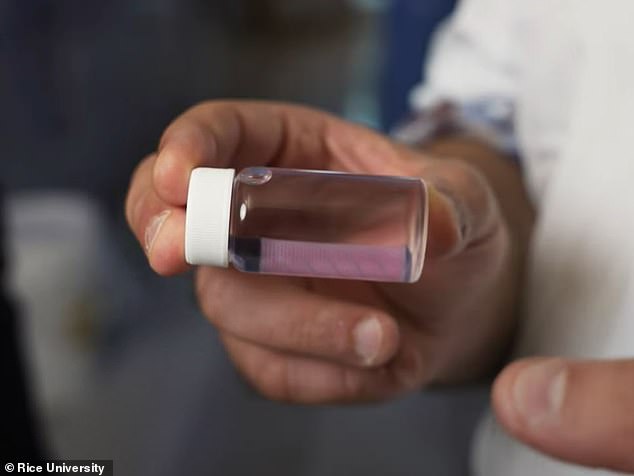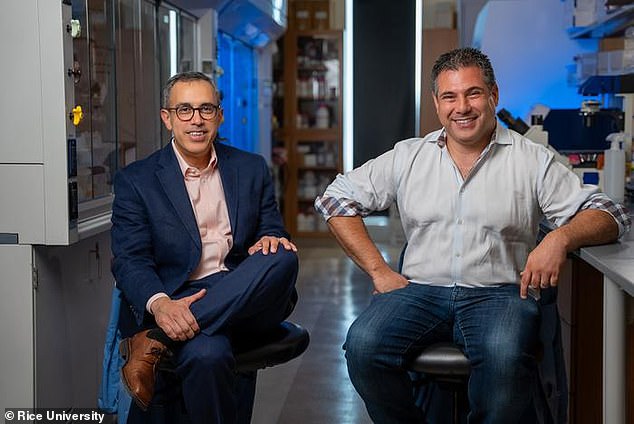Scientists are developing an implant smaller than a crayon that doctors hope will cure cancer in 60 DAYS
- The device is implanted in the abdomen and is smaller than a piece of chalk
- Researchers hope it can communicate wirelessly with smartphones
- READ MORE: Potential cancer breakthrough as ‘game-changing’ pill
Scientists are developing an implant smaller than a piece of chalk and hope it will cure cancer in just 60 days.
Researchers from seven states led by Rice University in Houston, Texas, have developed a three-inch implantable device that works as both a cancer detection system and a drug delivery system.
Doctors determine which medications a patient needs and then put that medication into the device so it gets into the body.
The Hybrid Advanced Molecular Production Regulator – or HAMMR – is packed with sensors that monitor rapidly mutating cancer cells and adjust the delivery of immunotherapy drugs based on a patient’s response.
‘This type of closed-loop therapy has been used to manage diabetes, where you have a glucose monitor that talks to an insulin pump continuously. But for cancer immunotherapy it is revolutionary,” says bioengineer Omid Veiseh, lead researcher on the team.
The new device is one of several new cancer-curing technologies being developed. Recently, an early study found that a ‘game-changing’ pill eradicates all types of solid tumors.
Immunotherapy is a form of cancer treatment that uses substances made by the body or in a laboratory to boost the immune system in the hope that the body will fight the cancer naturally.
Researchers from seven states led by Rice University in Houston, Texas, have developed a three-inch implantable device that works as both a cancer detection system and a drug delivery system.

The device (shown) is smaller than an adult’s finger

Lead researchers Omid Veiseh (right) and Dr. Amir Jazaeri in Veiseh’s Rice University laboratory in August 2023
The researchers claim that the technology, the first of its kind, could improve immunotherapy outcomes for cancers that are difficult to treat, such as ovarian and pancreas, and reduce cancer deaths in the US by 50 percent.
Dr. Amir Jazaeri, another lead researcher on the team, said the device will help “gain real-time insight into how our cancer cells are changing so that we can change in parallel.”
The device can be implanted in the abdomen through a minimally invasive procedure.
It will then continuously monitor a patient’s cancer and adjust the dose of immunotherapy drugs in real time.
“This device will communicate wirelessly, possibly with a smartphone, and also be externally rechargeable,” Dr. Jazaeri said KHOU11.
“Essentially how your iWatch charges today,” said Dr. Vesieh.
The implant would allow doctors to respond to any changes in the cancer much faster than the current system of waiting for test results and developing a new treatment plan, which can take months.
The team recently received funding for a first-stage clinical trial of the implant for the treatment of recurrent ovarian cancer.
The researchers claim that HAMMR should only be needed for about two months as they hope it can cure a patient’s cancer within 60 days.
Their goal is to have the device in human testing within five years.
In Texas alone, more than 130,000 new cases of cancer are diagnosed each year and more than 42,000 people die from the disease each year.
In another potential cancer breakthrough, brain surgeons earlier this month developed a device the size of a grain of rice that they hope could be a breakthrough in the treatment of deadly brain cancers.
The 6mm long device is implanted on the surface of tumors, where it delivers drugs to the masses to shrink or kill them.
When implanted into difficult-to-treat brain tumors, the device can deliver several different cancer drugs at once.
It was tested in six patients with glioblastoma, the deadly brain cancer that killed President Joe Biden’s son, Joseph (Beau) Biden III, and Senator John McCain.
Their main goal was to determine if the devices could be safely implanted, which they believed was possible.
